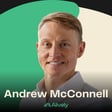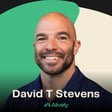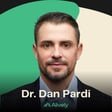
What's Really Causing Your Obesity and How To Fix It with Jonathan Boulware - E66
Habits hold more power over our health than most of us care to admit, trapping us in cycles of stress eating, self-doubt, and failed attempts to change. For many, this means struggling with ongoing obesity, a disease that millions struggle to break free from.
This episode lays bare why true health transformation begins with self-awareness, compassion, and a clear-eyed look at the root causes behind our choices. It walks step by step through building a foundation for lasting change - not by piling on shame or impossible goals, but by creating new patterns from the inside out. You’ll hear straight talk and a practical playbook from someone who’s battled these challenges firsthand, and emerged ready to help others do the same.
Jonathan Boulware is a personal trainer and behavior change specialist. Following his own journey with obesity, and the passing of his mother from the disease, he developed the 432 Playbook, a practical framework for sustainable lifestyle change, and has worked with dozens of clients facing chronic weight and health issues. Jonathan's approach is grounded in research-backed strategies that have resonated with anyone seeking lasting well-being, and a sound way to beat obesity.
“Every time I felt stress I would turn to food in order to get that reward of relief and relaxation, and find a way to justify it. That was my problem to solve.” - Jonathan Boulware
In this episode you will learn:
- Why habits drive behavior, and how breaking negative patterns starts with a shift in mindset.
- The key role of personal “why” in driving lasting lifestyle and weight changes.
- Why self-forgiveness and self-care matter in overcoming mental barriers to health.
- How to build a strong foundation for healthy change using five simple steps.
- Why focusing on process over outcomes leads to more lasting results.
- The value of small, steady wins and setting up your home for healthy choices.
Resources
- Connect with Jonathan on Linkedin: https://www.linkedin.com/in/jonathan-boulware-b29b54bb/
- Learn more about Jonathan’s offerings on ‘You Can Beat Obesity’: https://www.youcanbeatobesity.com/
- Join Jonathan’s ‘Fight Against Obesity’: https://www.youcanbeatobesity.com/book
This podcast was produced by the team at Zapods Podcast Agency:
Find the products, practices, and routines discussed on the Alively website:
















